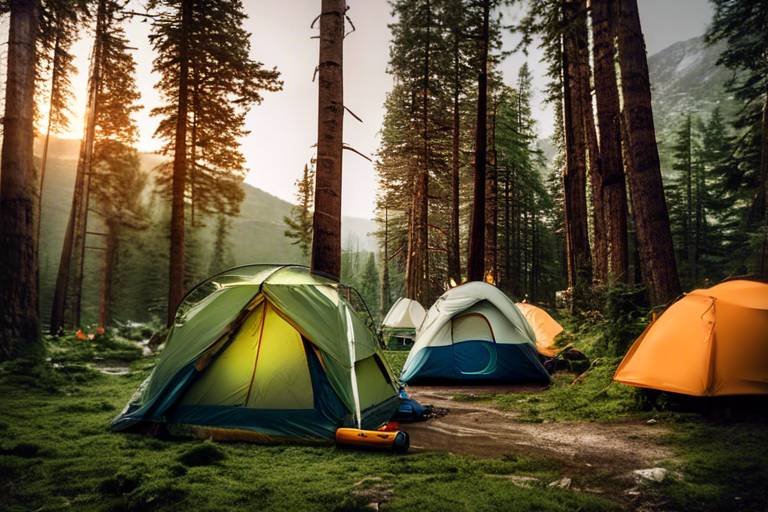10 Tips for Sustainable Camping Adventures
Embarking on a camping adventure is an exhilarating experience, but have you ever considered the impact your outdoor escapades have on the environment? Sustainable camping is the way to go, ensuring that you enjoy the great outdoors while treading lightly on nature's delicate balance. Here are ten essential tips to make your camping trips eco-friendly and sustainable:
1. Choose Eco-Friendly Gear: When gearing up for your camping trip, opt for equipment made from recycled or biodegradable materials. By selecting sustainable gear, you can reduce waste and lower your carbon footprint, all while enjoying the great outdoors responsibly.
2. Practice Leave No Trace Principles: One of the fundamental rules of sustainable camping is to leave no trace. Always follow guidelines to leave your campsite as pristine as you found it, respecting nature and preserving wildlife habitats for future generations to enjoy.
3. Opt for Reusable Items: Say goodbye to single-use plastic by using reusable water bottles, utensils, and containers during your camping trip. Minimizing plastic waste is a simple yet impactful way to contribute to a more sustainable outdoor experience.
4. Plan Eco-Friendly Meals: Embrace sustainable eating habits by preparing meals with locally sourced, organic ingredients. By minimizing packaging and waste, you can enjoy delicious meals while reducing your environmental impact.
5. Use Biodegradable Toiletries: Keep nature pristine by choosing biodegradable soaps, shampoos, and toiletries. By opting for products that break down naturally, you can prevent harmful chemicals from polluting water sources and ecosystems.
6. Conserve Water and Energy: Practice water-saving techniques during your camping trip and utilize energy-efficient lighting and devices. By conserving resources, you can minimize your environmental footprint and enjoy a more sustainable outdoor experience.
7. Respect Wildlife: While exploring nature, remember to observe wildlife from a safe distance and avoid feeding them. Store your food securely to prevent attracting animals to your campsite, respecting their natural habitats and behaviors.
8. Support Sustainable Campgrounds: Choose campgrounds that prioritize sustainability practices, such as recycling programs and renewable energy sources. By supporting eco-conscious campsites, you contribute to the preservation of natural landscapes and resources.

Choose Eco-Friendly Gear
When embarking on sustainable camping adventures, one of the crucial considerations is to that aligns with your commitment to reducing environmental impact. Opting for camping equipment crafted from recycled materials or biodegradable substances can significantly contribute to minimizing waste generation and lowering your carbon footprint.
Imagine setting up your campsite with gear that not only serves its purpose effectively but also leaves a positive impact on the environment. From tents made of recycled plastics to sleeping bags crafted from renewable resources, each choice you make can play a part in preserving nature for future generations.

Practice Leave No Trace Principles
When embarking on a camping adventure, it's crucial to adhere to the principles of Leave No Trace to ensure minimal impact on the environment. Imagine your campsite as a delicate ecosystem, where every action you take can either preserve or harm the natural balance. By following these principles, you not only respect nature but also contribute to the sustainability of our beautiful outdoor spaces.
One key aspect of Leave No Trace is to pack out what you pack in. This means taking all your trash with you when you leave, leaving no litter behind. Just as you wouldn't want someone to leave a mess in your home, nature deserves the same level of care and respect.
Another important principle is to respect wildlife. While it may be tempting to feed cute animals or approach them for a closer look, it's essential to observe them from a safe distance. Feeding wildlife can disrupt their natural behaviors and even endanger their health. Remember, we are visitors in their home, and it's our responsibility to ensure their safety and well-being.
Additionally, campfires should be managed responsibly. Before starting a fire, check if it's allowed in the area and use existing fire rings if available. After enjoying a cozy evening by the fire, make sure to fully extinguish it, leaving no embers behind. This not only prevents wildfires but also preserves the natural landscape for future campers to enjoy.
Respecting vegetation is also crucial. Avoid trampling on plants and sensitive areas, as they play a vital role in the ecosystem. Stick to designated trails and campsites to minimize your impact on the surrounding flora and fauna.
Lastly, practicing Leave No Trace principles involves being mindful of noise. While camping is a time to unwind and connect with nature, loud noises can disturb wildlife and other campers. Keep noise levels to a minimum, especially during quiet hours, to ensure a peaceful and harmonious camping experience for everyone.
By incorporating these Leave No Trace principles into your camping routine, you not only protect the environment but also set a positive example for others to follow. Remember, the wilderness is a gift that we must cherish and preserve for generations to come.

Opt for Reusable Items
Exploring ways to enjoy camping while minimizing your environmental impact and preserving nature for future generations.
When embarking on a camping adventure, one of the most impactful choices you can make is opting for reusable items. By choosing reusable water bottles, utensils, and containers, you can significantly reduce single-use plastic waste during your trip. Imagine the convenience of sipping water from a durable bottle that you can refill at any freshwater source along your journey, instead of contributing to the mountains of plastic waste that harm our environment. Additionally, using reusable utensils and containers not only minimizes waste but also adds a touch of sustainability to your camping experience.

Plan Eco-Friendly Meals
When planning your camping meals, opting for eco-friendly choices can make a significant difference in reducing your environmental impact. By selecting locally sourced and organic ingredients, you not only support local producers but also minimize the carbon footprint associated with transportation. Imagine cooking a delicious meal under the stars with ingredients that have been sourced sustainably, adding a touch of nature's essence to your dining experience.
Additionally, focusing on minimal packaging can further enhance the sustainability of your meals. Choosing products with minimal or recyclable packaging reduces the amount of waste generated during your camping trip. Picture enjoying your meal without the distraction of excess packaging cluttering your campsite, allowing you to fully immerse yourself in the natural surroundings.
Another vital aspect of planning eco-friendly meals is considering the cooking methods you use. Opting for energy-efficient cooking techniques, such as using a portable stove with minimal fuel consumption, can help conserve resources during your outdoor culinary adventures. By embracing sustainable cooking practices, you not only reduce your environmental impact but also set a positive example for others to follow.
Moreover, planning your meals in advance and portioning ingredients wisely can prevent food waste, which is a significant contributor to environmental degradation. By preparing just the right amount of food and storing leftovers properly, you can minimize the amount of organic waste generated at your campsite. Picture a camping trip where every meal is savored to the last bite, leaving behind no traces of unnecessary food waste.
Incorporating eco-friendly meal planning into your camping adventures not only benefits the environment but also enhances your overall experience by fostering a deeper connection with nature. By making conscious choices about the food you consume and how you prepare it, you can enjoy delicious meals while treading lightly on the environment, ensuring that future generations can also revel in the beauty of the great outdoors.

Use Biodegradable Toiletries
When embarking on a camping adventure, it's crucial to consider the impact of the toiletries you bring along. Opting for biodegradable toiletries can significantly reduce the harm caused to the environment. These products are designed to break down naturally, preventing harmful chemicals from polluting water sources and ecosystems. By choosing biodegradable soaps, shampoos, and other toiletries, you can enjoy your camping experience while protecting nature at the same time.
Imagine a picturesque campsite surrounded by lush greenery and crystal-clear streams. Now, picture the horror of discovering that the water sources are contaminated with chemicals from non-biodegradable toiletries. The tranquility of nature disrupted by human negligence. By making the simple switch to biodegradable options, you can prevent this scenario and preserve the beauty of the wilderness for generations to come.
Additionally, using biodegradable toiletries aligns with the Leave No Trace principles of camping. It ensures that your footprint on the environment is minimal and that you are respecting the delicate balance of nature. These products break down naturally, leaving no lasting impact on the environment, unlike their non-biodegradable counterparts that can linger for years, causing harm to wildlife and ecosystems.

Conserve Water and Energy
Exploring ways to enjoy camping while minimizing your environmental impact and preserving nature for future generations.
When embarking on a camping trip, being mindful of your water and energy usage can significantly contribute to sustainability efforts. By conserving these precious resources, you not only reduce your environmental footprint but also ensure a more enjoyable experience in nature.
One effective way to conserve water is by utilizing water-saving techniques such as taking shorter showers, turning off the tap while brushing your teeth, and collecting rainwater for various campsite needs. Additionally, consider using biodegradable soaps to minimize water pollution and protect aquatic ecosystems.
Opting for energy-efficient lighting and devices can also make a difference during your camping adventures. Choose solar-powered lanterns or rechargeable batteries to illuminate your campsite, reducing the reliance on non-renewable energy sources. Being mindful of energy consumption by turning off lights when not in use and unplugging electronic devices can further contribute to a sustainable camping experience.
By incorporating these practices into your camping routine, you can enjoy the great outdoors while minimizing your impact on the environment and preserving natural resources for future generations.

Respect Wildlife
Exploring ways to enjoy camping while minimizing your environmental impact and preserving nature for future generations.
When immersing yourself in the great outdoors during a camping adventure, it is essential to and their natural habitats. Remember, you are a guest in their home, so treat them with the utmost care and consideration. Avoid disturbing animals by observing them from a safe distance and refraining from feeding them. Additionally, ensure that your food is stored securely to prevent attracting wildlife to your campsite. By respecting wildlife, you contribute to maintaining the delicate balance of nature and safeguarding the well-being of all creatures that call the wilderness their home.

Support Sustainable Campgrounds
Supporting sustainable campgrounds is crucial for minimizing the environmental impact of your camping adventures. By choosing campgrounds that prioritize sustainability practices, you contribute to the preservation of natural resources and ecosystems. Sustainable campgrounds often implement recycling programs, utilize renewable energy sources, and promote eco-friendly initiatives to reduce waste and carbon emissions. When you opt for a sustainable campground, you are actively supporting efforts to protect the environment and ensure that future generations can continue to enjoy the beauty of nature.
Frequently Asked Questions
- What should I consider when choosing eco-friendly camping gear?
When selecting eco-friendly camping gear, look for items made from recycled materials or biodegradable components. Opt for products that have minimal packaging and are designed for long-term use to reduce waste.
- How can I practice Leave No Trace principles while camping?
To practice Leave No Trace principles, ensure you clean up after yourself, dispose of waste properly, respect wildlife and vegetation, and minimize your impact on the environment. Leave the campsite as you found it to preserve nature for others.
- Why is it important to use reusable items during camping trips?
Using reusable items such as water bottles, utensils, and containers helps reduce single-use plastic waste that can harm the environment. By opting for reusable products, you can minimize your ecological footprint and contribute to a cleaner camping experience.
- How can I support sustainable campgrounds?
You can support sustainable campgrounds by choosing facilities that prioritize eco-friendly practices, such as recycling programs, renewable energy sources, and conservation efforts. By patronizing sustainable campgrounds, you contribute to the preservation of natural habitats and resources.



















